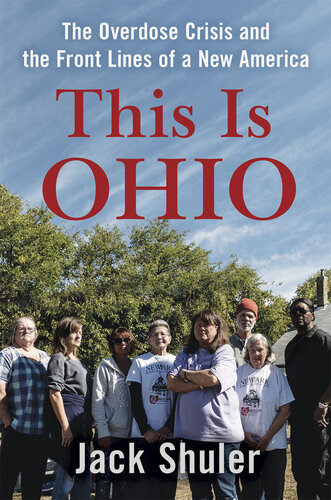
This Is Ohio
The Overdose Crisis and the Front Lines of a New America
کتاب های مرتبط
- اطلاعات
- نقد و بررسی
- دیدگاه کاربران
نقد و بررسی

May 18, 2020
Journalist Shuler (The Thirteenth Turn) offers a harrowing look at the opioid epidemic in the Rust Belt community of Licking County, Ohio. Writing with great empathy, he documents the daily lives of opioid addicts, as well as the work of community activists struggling to reduce overdose deaths and limit the spread of hepatitis and other ill effects of drug abuse through harm reduction initiatives. Shuler categorizes the opioid epidemic as a human rights problem, describes the “war on drugs” as a grievous mistake, and focuses more on identifying the systemic causes of addiction—including income inequality, unemployment, and inadequate medical care—than exposing the role of overprescribing doctors and pharmaceutical companies. Despite the grim nature of the topic, he offers a dash of hope and inspiration in profiles of grassroots efforts to repair the social fabric of Licking County, and in his own willingness to get involved by taking addicts to meetings, visiting homeless camps, and learning how to administer anti-overdose medication. This impressively researched and deeply felt account does a devastating job of personalizing the failures of U.S. drug policy.

July 15, 2020
Another alarming report from the front lines of the opioid epidemic. Shuler, who teaches journalism at Denison University, focuses his on-the-ground study in nearby Newark, Ohio, "a microcosm of the U.S. economy--a once-prosperous industrial city that has felt the effects of neoliberal free-trade policies." Though not far from Columbus, Newark is also perched on the edge of Appalachia; it suffers from all the troubles of a Rust Belt city, including a populace that is largely unprepared for this long-term economic shift and has not been quick to reeducate itself. Thus begins a kind of self-fulfilling prophecy--as Shuler points out, the toll that opioids take on the under- or uneducated means more than four times the death rate as compared to those with even some college. This speaks to the current notion, propounded by economists Anne Case and Angus Deaton, of "deaths of despair." As Shuler further notes, although the opioid crisis is indisputably a matter of public health and "a form of collective trauma on par with the HIV/AIDS crisis," it is generally treated as a criminal matter, which only exacerbates the problem. Some of Shuler's informants have had it a little better in life but still fall victim: a woman of a comparatively privileged background who turned to drugs to self-medicate for bipolar disorder and who deems the current overdose crisis--"since 2000, the accidental overdose rate in Ohio has more than tripled"--a human rights crisis as well. The author ventures some eminently practical measures, including making lifesaving medications widely available; more users, he urges, "could be saved from an opioid overdose death if more people had naloxone." Furthermore, we blame drugs too readily when "they're just a symptom" of a greater social crisis we continually fail to address. Though not quite on par, this book should be shelved next to Beth Macy's Dopesick and Sam Quinones' Dreamland. Full of grim yet important statistics and vignettes as well as a few sensible solutions.
COPYRIGHT(2020) Kirkus Reviews, ALL RIGHTS RESERVED.

August 1, 2020
This profoundly humanizing investigation surveys the opioid addiction and overdose crisis as experienced in the Ohio community of Newark, east of Columbus. Shuler (The Thirteenth Turn) teaches at nearby Denison University and travels through the Ohio epicenter of the opioid crisis, from Dayton to Portsmouth. He meets and walks with many people who use drugs, and many more who care about and advocate for them. Like the meetings, events, shelters, and grassroots service projects he visits, Shuler's book gives the opportunity for people to speak up and be heard. A tremendous stigma is attached to drug use, yet users are capable, productive, human, and need to be included in the development of solutions. Lived experience is key to understanding and addressing addiction, which Shuler identifies as a public health problem, and an economic and social problem encompassing race, poverty, and power. VERDICT The commitment, tenacity, and empathy of the users, activists, and advocates Shuler meets is a stark corrective to the disdain and dehumanization typical of policy and practice in this area. The title forcefully claims this story for Ohio, a statistical center, but addiction reaches all places, and this book is strongly recommended for readers anywhere who are interested in systemic change and the power of the grassroots. [See Prepub Alert, 3/4/20.]--Janet Ingraham Dwyer, State Lib. of Ohio, Columbus
Copyright 2020 Library Journal, LLC Used with permission.

























دیدگاه کاربران